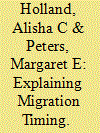|
|
|
Sort Order |
|
|
|
Items / Page
|
|
|
|
|
|
|
| Srl | Item |
| 1 |
ID:
172833


|
|
|
|
|
| Summary/Abstract |
How do migrants decide when to leave? Conventional wisdom is that violence and economic deprivation force migrants to leave their homes. However, long-standing problems of violence and poverty often cannot explain sudden spikes in migration. We study the timing of migration decisions in the critical case of Syrian and Iraqi migration to Europe using an original survey and embedded experiment, as well as interviews, focus groups, and Internet search data. We find that violence and poverty lead individuals to invest in learning about the migration environment. Political shifts in receiving countries then can unleash migratory flows. The findings underscore the need for further research on what migrants know about law and politics, when policy changes create and end migrant waves, and whether politicians anticipate migratory responses when crafting policy.
|
|
|
|
|
|
|
|
|
|
|
|
|
|
|
|
| 2 |
ID:
167429


|
|
|
|
|
| Summary/Abstract |
At a time when many states are increasing restrictions on immigration, others are using formal agreements on international economic migration to open their borders. The use of international agreements on migration presents a puzzle, as most states can open their borders to migrants unilaterally. I argue that, when states cannot generate large enough flows of migrants or the right type of migrants to fill open positions in the labor market, they turn to the sending state to help them. States that need migrants can negotiate a bilateral labor agreement with a sending state, which then acts as a recruiter, helping to channel labor to the receiving state. This article details the conditions under which immigrant-receiving countries use these treaties and tests the implications of the argument on a new dataset on migration treaties.
|
|
|
|
|
|
|
|
|
|
|
|
|
|
|
|
| 3 |
ID:
138422


|
|
|
|
|
| Summary/Abstract |
What explains variation in immigration policy, especially policy regulating low-skill workers? A common argument invokes prejudice against foreigners as an explanation for why nations close their economies to immigrants. This prejudice has been ubiquitous throughout history even as immigration policies changed. Social theories of this sort may be descriptively true but are not helpful in predicting variation in policy. Other scholars have turned to the role that native labor plays in protecting its interests against immigration, but they have not explained why labor is able to restrict immigration when it has not been able to restrict trade, even though open trade has wreaked as much, if not more, havoc on labor. A third group of scholars focuses on states' concerns about the fiscal costs of immigrants as an explanation for the changes in policy over time. While fiscal costs are likely to play a role, this argument cannot explain exclusion prior to the creation of the modern welfare state in the early twentieth century. Finally, a fourth group of scholars has examined the power of immigrants themselves. While immigrants clearly affect immigration policy in democracies, they have never been a sufficiently large plurality of the polity to be able to change policy on their own, and they have less voice in autocracies where they can more easily be deported.
|
|
|
|
|
|
|
|
|
|
|
|
|
|
|
|
| 4 |
ID:
134978


|
|
|
|
|
| Summary/Abstract |
This article argues that immigration policy formation in the United States after 1950 can only be understood in the context of the increasing integration of world markets. Increasing trade openness has exposed firms that rely on immigrant labor to foreign competition and increased the likelihood that these firms fail. Increasing openness by other states to foreign direct investment (FDI) allowed these same firms to move production overseas. Firms' choices to close their doors or to move overseas decrease their need for labor at home, leading them to spend their political capital on issues other than immigration. Their lack of support for open immigration, in turn, allows policymakers to restrict immigration. An examination of voting behavior on immigration in the US Senate shows that the integration of world capital and goods markets has had an important effect on the politics of immigration in the United States and shows little support for existing theories of immigration policy formation. In addition to increasing one's understanding of immigration policy, this article sheds light on how trade openness and firms' choice of production location can affect their preference for other foreign economic policies as well as domestic policies such as labor, welfare, and environmental policies.
|
|
|
|
|
|
|
|
|
|
|
|
|
|
|
|
|
|
|
|
|